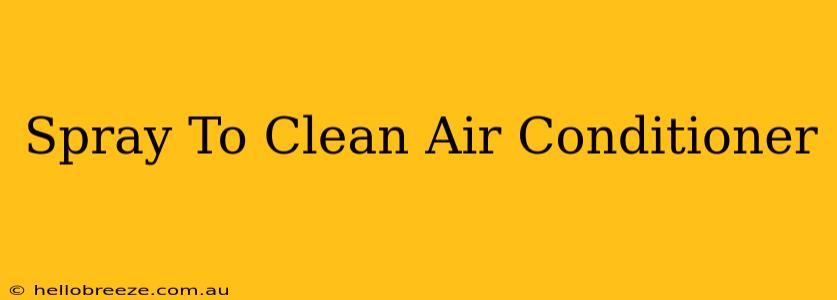Is your air conditioner blowing hot air instead of cool? Is it making strange noises? A dirty air conditioner is not only inefficient but can also be a health hazard. Fortunately, cleaning your AC unit doesn't require a professional—a simple spray cleaning can do wonders! This comprehensive guide explores everything you need to know about using spray cleaners for your air conditioner, ensuring optimal performance and a healthier home environment.
Why Spray Cleaning Your Air Conditioner is Essential
Regular cleaning of your air conditioner is crucial for several reasons:
-
Improved Efficiency: Dust and debris clog the coils and fins, reducing airflow and forcing your AC to work harder. This leads to increased energy consumption and higher electricity bills. Spray cleaning helps remove these blockages, restoring efficiency.
-
Extended Lifespan: A clean air conditioner is a long-lasting air conditioner. By removing dirt and grime, you reduce the strain on the unit's components, extending its lifespan and preventing costly repairs.
-
Better Air Quality: A dirty AC unit can circulate dust, allergens, mold, and other pollutants into your home. Spray cleaning helps eliminate these contaminants, improving indoor air quality and benefiting your health, particularly for allergy sufferers.
-
Preventative Maintenance: Regular spray cleaning acts as preventative maintenance, catching small problems before they escalate into larger, more expensive issues.
The Best Spray Cleaners for Your Air Conditioner
Not all sprays are created equal. When choosing a spray to clean your air conditioner, look for products specifically designed for this purpose. These cleaners usually contain:
- Degreasers: To dissolve stubborn grease and oil buildup.
- Disinfectants: To kill bacteria and mold.
- Non-corrosive formulas: To protect the delicate components of your AC unit.
Avoid using harsh chemicals or abrasive cleaners, which can damage the coils and fins.
Step-by-Step Guide to Spray Cleaning Your Air Conditioner
Before you begin, always disconnect the power supply to your air conditioner to prevent electrical shock.
-
Prepare your workspace: Cover the surrounding area with a drop cloth or newspaper to protect it from spray.
-
Pre-clean: Use a soft brush or vacuum cleaner to remove loose dirt and debris from the coils and fins.
-
Apply the spray: Hold the spray can about 6-8 inches away from the coils and fins. Apply the cleaner evenly, ensuring all surfaces are covered.
-
Allow it to sit: Let the cleaner sit for the recommended time as per the product instructions. This allows the cleaner to break down and dissolve the grime.
-
Rinse thoroughly: Use a garden hose with a gentle spray nozzle to rinse away the cleaner and dissolved debris. Make sure to rinse thoroughly to avoid residue buildup.
-
Dry completely: Allow the air conditioner to dry completely before reconnecting the power. You can use a dry cloth or fan to speed up the drying process.
Beyond the Spray: Additional Tips for Maintaining Your Air Conditioner
While spray cleaning is highly effective, consider these additional steps for optimal AC maintenance:
-
Regular Cleaning Schedule: Aim to spray clean your air conditioner at least once a year, or more frequently if you live in a dusty environment.
-
Change Air Filters Regularly: Dirty air filters restrict airflow and reduce efficiency. Change your filters according to the manufacturer's recommendations.
-
Professional Cleaning: For a more thorough cleaning, consider scheduling professional AC maintenance once a year.
Conclusion: A Cleaner AC, A Cleaner Home
Spray cleaning your air conditioner is a simple yet highly effective way to improve its performance, extend its lifespan, and enhance your home's air quality. By following these steps and incorporating additional maintenance tips, you can ensure a cool, comfortable, and healthy environment for your family. Remember to always prioritize safety and follow the instructions on your chosen cleaning product.

